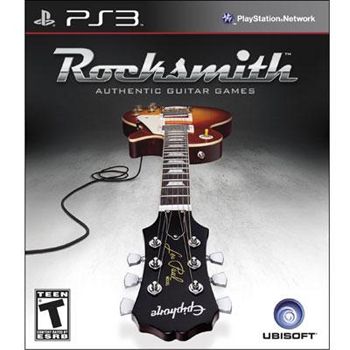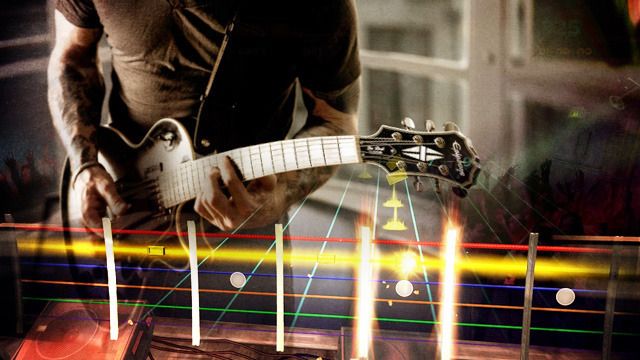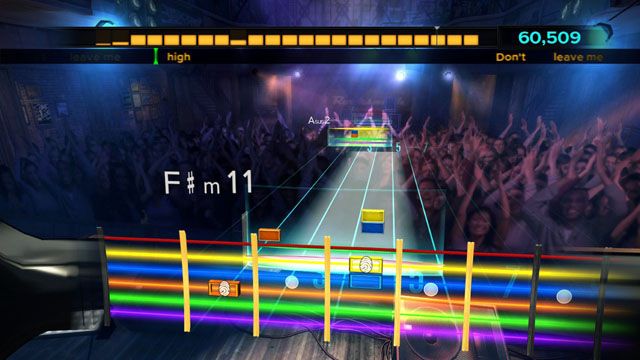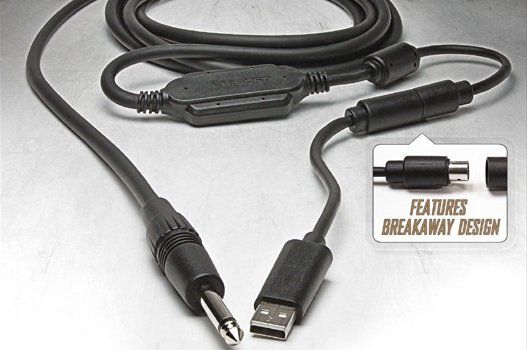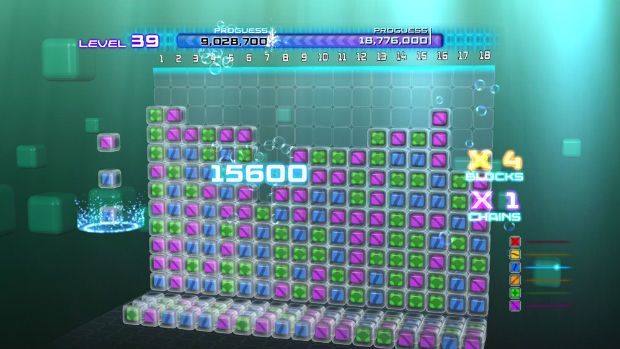The plastic-instrument game is dead, unfortunately. After Rock Band 3, that's become readily apparent. There's still a place for it (that place being your apartment during your New Year's Eve party), but...no one wants those things anymore, and people don't seem to have warmed up to Rock Band 3's Pro Mode guitar-teaching very well.
Despite this, Ubisoft's thrown their hat into the ring with Rocksmith, a "game" solely focused on teaching you guitar. How many post-college music students will (or should be) put out of a job by their new tool? Read on to find out.
First of all, it's important to note that Rocksmith is hardly a game. That's not what it is intended to be, but I'm sure Ubisoft (as a game developer) knows that the public would have a hard time receiving something not marketed as a game, and their marketing lately has started to lean more towards its educational uses rather than its use of game mechanics for educational purposes. At its heart, Rocksmith is edutainment; you're learning guitar while enjoying yourself with the songs and the game constructs used to present the education.
It's very, very effective at educating. I'm already a pretty good guitarist, but the game does an excellent job of pacing the songs (making them more difficult as you do well in them, until you fully "master" the sections) so that you can easily get into it if you're good and so you can learn your way through the songs if you're still new. It's not the best at this at first though; the first few setlists were pretty easy, but, as you get used to the game's interface and the difficulty starts rising up, it gets fun and intense, even for people who are already experienced with the instrument.
As for the game-like constructs, Rocksmith is very much like previous plastic-instrument games. You're given a setlist, you practice the songs in the setlist, and then you perform them all in a row at an event. If you do well enough at the event, you can unlock bonus encore songs (and double encores). You can also add more songs to the setlist to increase the amount of "Rocksmith Points" you get out of the event. Along with these events, you also unlock "Technique Challenges" that teach you new techniques as you encounter them in-game, from double stops to power chords to slides and bends to full barre chords and harmonics. When you complete these challenges, you then unlock games in the "Guitarcade" (good play on words) that improve your skill with those techniques.
There's a lot going on in Rocksmith, to say the least, but the main focus is learning the songs and doing the events. The setlist is very, very impressive, ranging from old Rolling Stones songs to Radiohead ("High and Dry") and some more obscure (for this sort of game) artists like Titus Andronicus ("A More Perfect Union"), Best Coast ("When I'm With You"), and Sigur Rós ("Gobbledigook"). My only issue with it is that there are a few songs from the same artist in there, from artists that...don't really deserve more than one song. The Rolling Stones have three songs in this game (including "(I Can't Get No) Satisfaction"), but that makes sense as they're so culturally important that more people are likely to know their songs. Muse and The Black Keys (though I enjoy the latter) are good too, but they lack that significance, and they don't really warrant having more than one song each in this game (each have two songs).
The encore system can be a bit annoying at times; it's not very fun to go into an event knowing all of the songs in your setlist, only to have another song of unknown quality appear at the end. I've had mixed experiences with the quality of the encore songs; it's great to unlock "Boys Don't Cry" by The Cure (Rockbertsmith) at the end of a long setlist, but being forced to play some mediocre rap-rock song after finally doing well at "High and Dry" really takes the fun out of the moment. But, that's a very subjective matter.
The "Guitarcade" is also a bit of a mixed bag. All of the games are focused on improving one technique, with their gameplay mechanics based around that. For example, the first game you unlock is "Ducks", which teaches you how to move up and down the frets of the guitar through an old-school shmup. It's slow at first, but it, like the songs, progresses in difficulty and gets fairly challenging, even for advanced players. On the whole, the games do a good job of supplementing the songs' ability to teach you the techniques, though a few, like "Big Swing Baseball" (which teaches bends), suffer from control issues and lack of tutorials.
Unfortunately, most of these things are bungled up at times due to occasional issues with Rocksmith's treatment of your input. The cable works extremely well most of the time; it's very well-built, and it generally picks up what you're doing perfectly. It slips up at times, though, like with the opening riff of "High and Dry" (double stopped with the first three strings open), where, even if you do the right chord, it doesn't recognize your input especially well a good amount of the time. These issues only pop up on occasion, but they really take the fun and education out of Rocksmith when they do.
The interface is rather tricky at first too, especially if you're a person who recognizes things like numbers and relative locations more than colors, but you get used to it over time, and eventually it becomes as easy as reading traditional guitar tablature. I can't see it being an easy thing to demo. In many ways, it's as difficult as actually learning the songs and guitar techniques. Like both of those, give it some time and practice, and you'll warm up to it.
There are also a few excellent ways of learning the songs in the game. There is the standard just-play-the-song-in-full mode, but there are also a few "riff repeater" modes, which allow you to practice parts of the song over and over again until you unlock that segment's "full version" (i.e. you'll be playing all of the original notes).
Once you max out all of a song's segments and score over 100,000 points on that song in one go, you unlock that song's "Master Mode", where you play the song in full, with no interface (excluding the song lyrics). "Master Mode" is the closest thing to actually performing the song in reality, and doing well on it is extremely satisfying, and not just because performing the song in "Master Mode" gives you twice as many points as the regular version. It makes you feel like you're really playing the guitar in front of a crowd, like you've made a lot of progress in learning the instrument, and in an educational tool like this, that satisfaction provides a lot of drive to keep going, to keep learning, to keep bettering yourself.
For doing well at songs, you also unlock "Authentic Tones", the guitar tones used in the songs that you can then use on your own in the game's Amp Creator. There, you can select all of the amps, cabinets (with mic adjustments), and pedals you unlocked and use them to create your own guitar tones for practice outside of the songs. The customization is extremely deep, and there is a great variety of pedals and cab/amp combinations. It also does a good job of teaching the user the meanings of various effects and how to layer them well, which is invaluable for real-life play.
The cord also works with audio editing software like FL Studio (which I tested it with), but for some reason when I used it, it output a very hard, fuzzy tone, despite not having any effect set on it. That might've been something up with FL Studio, but be warned. It works, but if you're looking for a clean tone, be wary.
Though it's not really a game in itself, Rocksmith makes extremely good use of game framing to give the player motivation to keep learning guitar. I believe that's the most important thing that Rocksmith does. Unlike your average dry guitar lesson from a post-college music major, it's extremely fun, and it's always there to help you out. It knows how to pace itself to your skill level, and it can provide education for learners of most skill levels. (Of course, you'll find this boring if you're extremely advanced, but even moderately-skilled players like myself should get a lot of enjoyment and education out of this product.)
If you're looking to learn guitar, this is the best learning tool for it I've ever used.

